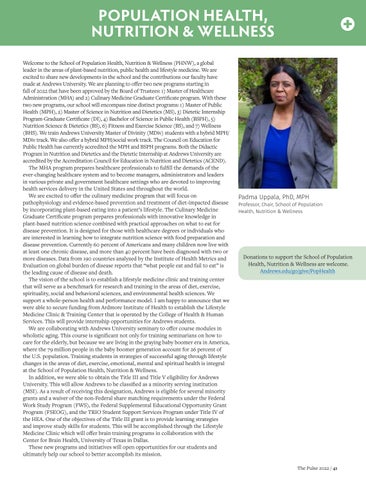POPULATION HEALTH, NUTRITION & WELLNESS Welcome to the School of Population Health, Nutrition & Wellness (PHNW), a global leader in the areas of plant-based nutrition, public health and lifestyle medicine. We are excited to share new developments in the school and the contributions our faculty have made at Andrews University. We are planning to offer two new programs starting in fall of 2022 that have been approved by the Board of Trustees: 1) Master of Healthcare Administration (MHA) and 2) Culinary Medicine Graduate Certificate program. With these two new programs, our school will encompass nine distinct programs: 1) Master of Public Health (MPH), 2) Master of Science in Nutrition and Dietetics (MS), 3) Dietetic Internship Program-Graduate Certificate (DI), 4) Bachelor of Science in Public Health (BSPH), 5) Nutrition Science & Dietetics (BS), 6) Fitness and Exercise Science (BS), and 7) Wellness (BHS). We train Andrews University Master of Divinity (MDiv) students with a hybrid MPH/ MDiv track. We also offer a hybrid MPH/social work track. The Council on Education for Public Health has currently accredited the MPH and BSPH programs. Both the Didactic Program in Nutrition and Dietetics and the Dietetic Internship at Andrews University are accredited by the Accreditation Council for Education in Nutrition and Dietetics (ACEND). The MHA program prepares healthcare professionals to fulfill the demands of the ever-changing healthcare system and to become managers, administrators and leaders in various private and government healthcare settings who are devoted to improving health services delivery in the United States and throughout the world. We are excited to offer the culinary medicine program that will focus on pathophysiology and evidence-based prevention and treatment of diet-impacted disease by incorporating plant-based eating into a patient’s lifestyle. The Culinary Medicine Graduate Certificate program prepares professionals with innovative knowledge in plant-based nutrition science combined with practical approaches on what to eat for disease prevention. It is designed for those with healthcare degrees or individuals who are interested in learning how to integrate nutrition science with food preparation and disease prevention. Currently 60 percent of Americans and many children now live with at least one chronic disease, and more than 40 percent have been diagnosed with two or more diseases. Data from 190 countries analyzed by the Institute of Health Metrics and Evaluation on global burden of disease reports that “what people eat and fail to eat” is the leading cause of disease and death. The vision of the school is to establish a lifestyle medicine clinic and training center that will serve as a benchmark for research and training in the areas of diet, exercise, spirituality, social and behavioral sciences, and environmental health sciences. We support a whole-person health and performance model. I am happy to announce that we were able to secure funding from Ardmore Institute of Health to establish the Lifestyle Medicine Clinic & Training Center that is operated by the College of Health & Human Services. This will provide internship opportunities for Andrews students. We are collaborating with Andrews University seminary to offer course modules in wholistic aging. This course is significant not only for training seminarians on how to care for the elderly, but because we are living in the graying baby boomer era in America, where the 79 million people in the baby boomer generation account for 26 percent of the U.S. population. Training students in strategies of successful aging through lifestyle changes in the areas of diet, exercise, emotional, mental and spiritual health is integral at the School of Population Health, Nutrition & Wellness. In addition, we were able to obtain the Title III and Title V eligibility for Andrews University. This will allow Andrews to be classified as a minority serving institution (MSI). As a result of receiving this designation, Andrews is eligible for several minority grants and a waiver of the non-Federal share matching requirements under the Federal Work Study Program (FWS), the Federal Supplemental Educational Opportunity Grant Program (FSEOG), and the TRIO Student Support Services Program under Title IV of the HEA. One of the objectives of the Title III grant is to provide learning strategies and improve study skills for students. This will be accomplished through the Lifestyle Medicine Clinic which will offer brain training programs in collaboration with the Center for Brain Health, University of Texas in Dallas. These new programs and initiatives will open opportunities for our students and ultimately help our school to better accomplish its mission.
Padma Uppala, PhD, MPH
Professor, Chair, School of Population Health, Nutrition & Wellness
Donations to support the School of Population Health, Nutrition & Wellness are welcome. Andrews.edu/go/give/PopHealth
The Pulse 2022 / 41








